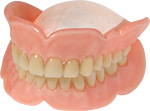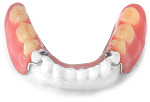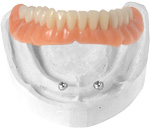Dentures
- A complete denture is one which replaces all of the patient's natural teeth.
- A partial denture is one which replaces one or more teeth but not all of them.
- A removable implant-retained denture is supported by abutment(s) integrated into the bony tissue.
- Immediate dentures are inserted immediately after the removal of a patient's teeth.
- Soft liners ease the discomfort of some patients when chewing.
Complete dentures
Complete or 'full' dentures are worn by patients who are missing all their teeth in either maxillary (upper) or mandibular (lower) arch.
A patient who is missing all their teeth in both arches will have a pair of complete dentures, such as the ones shown at right which feature a clear top palate.
Partial dentures
A partial denture may be tooth-supported or tooth and tissue supported. There are significant differences between theses two types of dentures. These differences are best explained by your dental prosthetist.
With newer designs, materials and techniques, partials are more comfortable than ever before. Ask your dental prosthetist about the many designs available, some of which have no visible clasps and are virtually undetectable.
The number of teeth remaining, the position and the stability of the teeth are only a few of the factors that help to determine what style or type of partial denture would be best for you. Partials can be made of different materials:
- Acrylic partials are usually used as a transitional or temporary replacement of missing teeth, depending on your personal circumstances.
- The metal/acrylic partial – commonly called a cast partial – is usually a more rigid and permanent style of denture. The metal is either a highly compatible chrome-cobalt alloy or titanium, which are both ultra-thin, light and very strong.
- The new thermoplastics offer the twin advantages of aesthetics and flexibility.
All partials are designed to be removable and should be removed nightly to contribute to a healthy oral environment.
The benefits of partialsPartial dentures do not harm remaining natural teeth. A partial denture may prevent your natural teeth from shifting or drifting into the space left by the loss of a natural tooth. In fact, a partial denture may help maintain the position of your natural teeth by providing them with additional support.
With a partial denture, you’ll look better, feel better and chew better!
Overdentures
An overdenture is a removable denture that fits over a small number of remaining natural teeth or implants. The natural teeth must be prepared to provide stability and support for the denture. Your dental prosthetist can determine if an overdenture would be suitable for you.
Implant-retained dentures
An implant-retained denture utilises direct connections to titanium abutments which are integrated into the bony tissue. They overcome the instability and lack of retention of a common complete denture.
Implant-retained dentures are relatively inexpensive when compared to more sophisticated types of implant restoration such as crowns, but they are very effective. Also, being removable, an implant-retained denture is easy to clean and care for, thus reducing future expenses.
Immediate dentures
Immediate dentures are inserted immediately after the removal of teeth. To make this possible, the dental prosthetist takes measurements and makes the models of the patient's jaws while natural teeth are still in position, during a preliminary visit prior to extraction.
An advantage of immediate dentures is that the wearer does not have to be without teeth during the healing period. However, bones and gums can shrink over time, especially during the period of healing in the first six months after the removal of teeth. When gums shrink, immediate dentures may require rebasing or relining to fit properly. A conventional denture can then be made once the tissues have healed. Healing of the soft tissue may take up to 8 weeks; bone can take many months to heal completely.
Soft liners
If your dental prosthetist has meticulously adjusted the fit of your dentures and you are still unable to find comfort with your denture, you may want to consider a soft liner.
Soft liners are a medical-grade soft polymer material applied to the tissue-fitting surface of your hard denture base. Soft liners behave like a shock-absorbing cushion when you are chewing. Soft liners can be applied to new dentures or old dentures, with a reline and rebase treatments.
With careful home-care cleaning, soft liners have an average lifespan of two to four years depending on the physiology of the patient.
Soft liners are appropriate for:
- Flat or nearly-flat gum tissues
- Ridges with thin tissues over bony areas
- Chronically sore gum tissues





